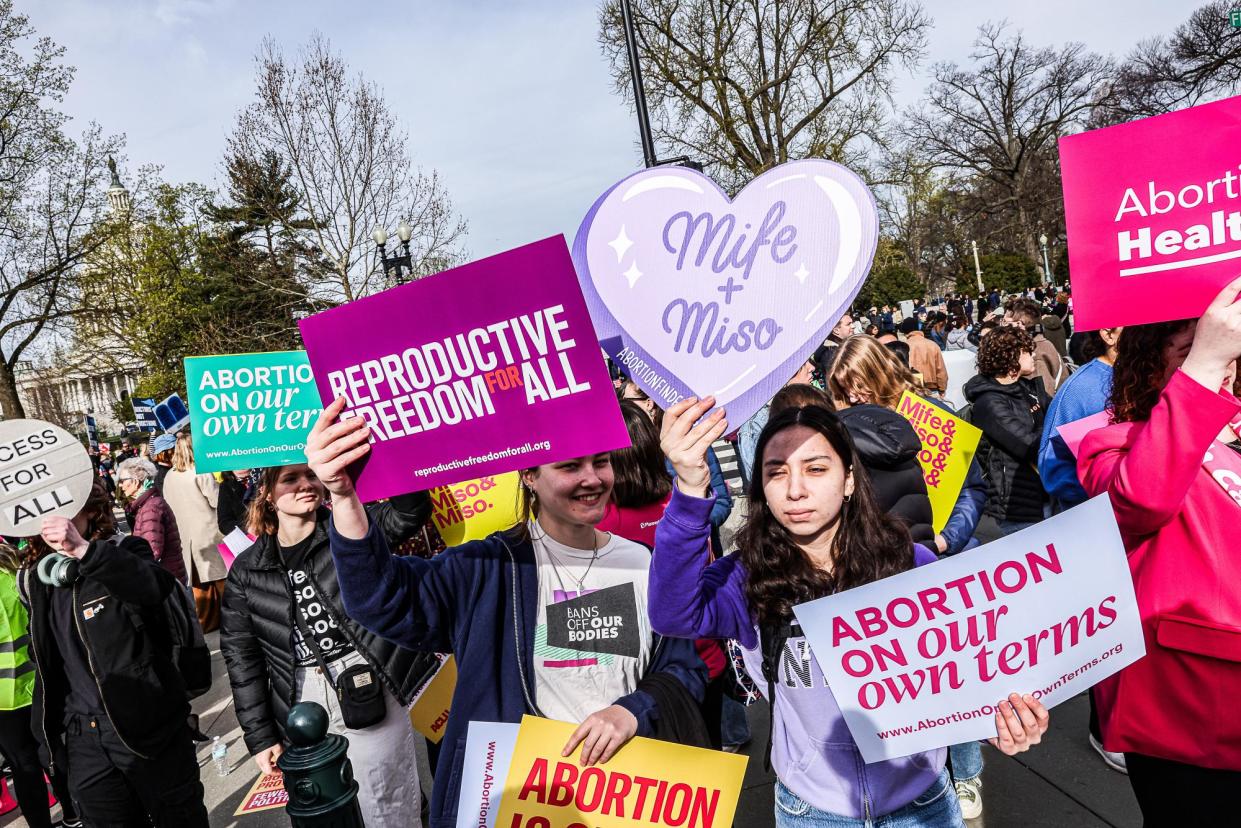Despite the supreme court ruling for the abortion pill, the battle is far from over

The US supreme court has rejected an effort by anti-abortion activists to roll back access to a common abortion pill – but the battle over the pill is far from over, both in the courts and in legislatures.
In a 9-0 unanimous decision on Thursday, the US supreme court ruled that anti-abortion activists did not have standing, or the legal right to sue, over the Food and Drug Administration’s (FDA) regulation of mifepristone, one of two drugs typically used in a US medication abortion. But because the case turns on an interpretation of legal doctrine, the justices left open the possibility that someone else may challenge mifepristone in the future.
Judge Matthew Kacsmaryk, a federal judge in Texas who first heard arguments in the case, has allowed Missouri, Idaho and Kansas to join the case as plaintiffs. Although the supreme court declined to let those states join the case once it was before Scotus, the states may continue litigating it at a lower-court level and evade the standing defects that doomed the case’s original plaintiffs.
The powerful anti-abortion group, SBA Pro-Life America, already emphasized that possibility in the organization’s statement on the Thursday ruling.
“The pro-life states of Idaho, Kansas and Missouri are seeking to take up the challenge based on harms suffered by women in their states,” the group said.
Mary Ziegler, a professor at the University of California, Davis who studies the legal history of reproduction, noted that “this ruling doesn’t preclude anyone else from bringing the same claim.
Related: Largest Protestant US group condemns IVF in win for anti-abortion movement
“Until or unless the supreme court actually rejects these claims on the merits, they’re not going anywhere,” she said.
As medication abortion now accounts for more than 60% of all US abortions, gutting access to it has become a major goal of the anti-abortion movement in the years since the supreme court overturned Roe v Wade.
If anti-abortion advocates are not able to curb access to mifepristone through the courts, they may be able to do so through the White House. An administration headed by Donald Trump could, for example, try to direct the FDA to change its approach to mifepristone. The Thursday ruling, written by Justice Brett Kavanaugh, seems to touch on this possibility.
“The plaintiffs may present their concerns and objections to the President and FDA in the regulatory process, or to Congress and the President in the legislative process,” Kavanaugh wrote. “And they may also express their views about abortion and mifepristone to fellow citizens, including in the political and electoral processes.”
Elizabeth Sepper, a professor at the University of Texas at Austin, emphasized that “they don’t mean Joe Biden”.
“I think there’s a very strong signal in the opinion that, well, if and when Donald Trump wins the presidency, head straight to the administration and ask them to change the approval of mifepristone,” she told the Guardian.
Still, Nicole Huberfeld, a health law professor at Boston University’s school of public health, is not convinced such an effort would be successful. “It’s not as if the president can just wave his hand and have things happen at the FDA,” Huberfeld said. “You can’t always tell the scientists what you want them to say.”
A future Trump administration could also target mifepristone using the Comstock Act, a 19th-century anti-vice law that, some anti-abortion activists argue, bans the mailing of all abortion-related materials. The Biden administration has disagreed with that interpretation, issuing guidance arguing that the Comstock Act only bans such materials if the sender intends to use them to break the law, but a Trump administration may take a more hardline approach. Without involving Congress, Trump could use the Comstock Act to outlaw the mailing of mifepristone – which would result in a de facto ban on the pill.
Project 2025, a playbook written by the influential conservative thinktank the Heritage Foundation, recommends that a future conservative administration do just that.
During oral arguments in the mifepristone case, both Justices Samuel Alito and Clarence Thomas – the most conservative justices on the supreme court – brought up the Comstock Act. However, there was no mention of the law in either Thursday’s majority opinion or a concurrence by Thomas.
Sepper suspects that the omission was a canny play by the conservative faction of the supreme court.
“There’s been concerns in the conservative legal movement that admitting Comstock would be revived in a Trump administration would be a poor political play. And so not mentioning Comstock at all is just wise strategy,” Sepper said. “It certainly diverts attention from Comstock.”

 Yahoo News
Yahoo News 
